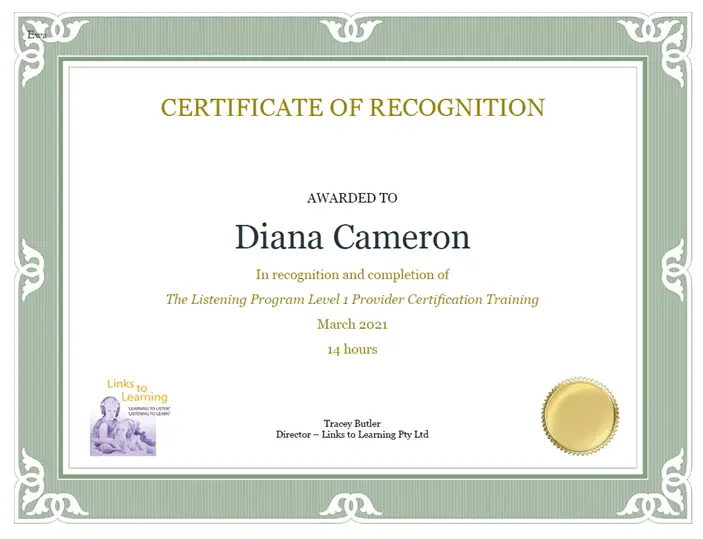What is The Listening Program? TLP is psychoacoustically modified music, scientifically proven to help those with autism, which uses a variety of filters to manipulate the sound in order to control the range of sound. This drug free, non-invasive approach uses specific ranges which relate to cognitive tasks which can be improved with regular listening.
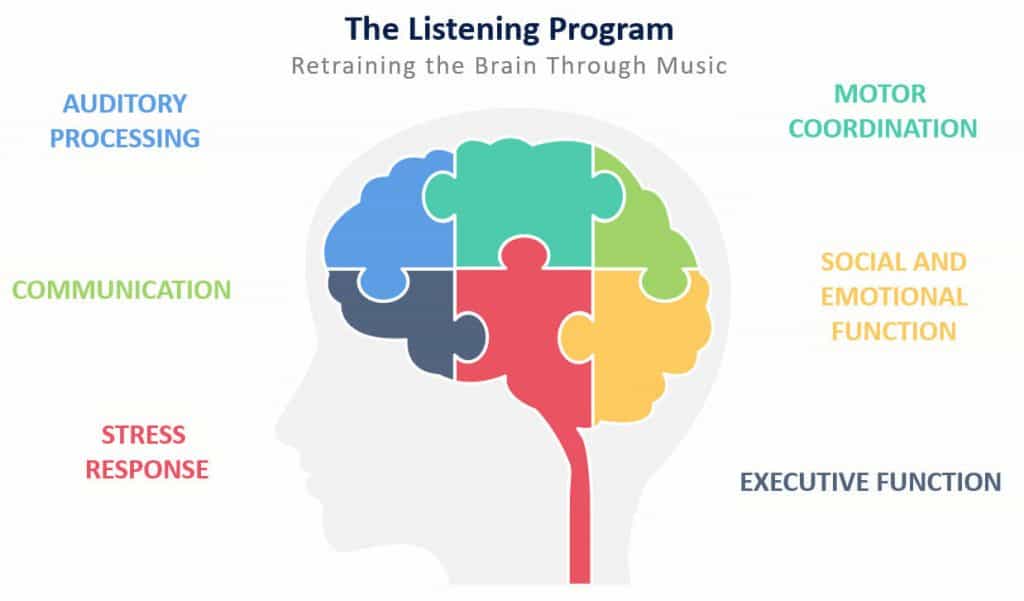
This pioneering learning system using innovative technology opens the learning pathways in the brain using psychoacoustically modified music.
So What Exactly is TLP?
It’s hard to believe that listening to classical music could help to alleviate some of the behaviors we see with kids with autism but Advanced Brain Technologies bases some of the principles of The Listening Program® on scientific research by French ear surgeon Dr. Alfred Tomatis who made a series of discoveries about the ear and its relationship to brain development.
He showed that the auditory nerve is fundamental to human neurology; it helps to regulate not only balance and spatial orientation, but even vision and our tactile senses. He also discovered that sound is a nutrient that can stimulate and feed the brain. One of his greatest innovations was to find new ways to stimulate the ear and brain that can improve learning and behavior.
The Listening Program® is designed to improve the listener’s processing of sound – which is quite different from hearing. It is designed to work on the physiological and neurological structure of the brain – quite different to music therapy which is of psychological benefit.
Children with autism usually do not possess all the auditory skills necessary for accurate and timely processing. Deficits in the some or many auditory skills can result in sensory integration difficulties, reading, comprehension, writing challenges, speech and other problems.
How Can it Help Kids with Autism?
There are potential benefits for individuals experiencing the following difficulties:
- Learning
- Attention
- Auditory Processing
- Communication and Social
- Speech and Language
- Reading and Spelling
- Comprehension
- Sensory Integration
- Executive Function
- Anxiety/Stress
- Poor Motor Coordination
- Ability to be more flexible with routines
In addition to autism, other challenges usually exist which prevent children from learning and living to their full potential. These may include neuro-developmental delay, a disorganized central nervous system, immature reflexes (or reflexes that have not been fully integrated), auditory processing challenges, anxiety, and food sensitivity.
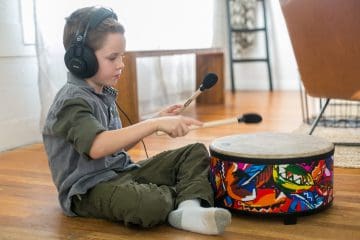
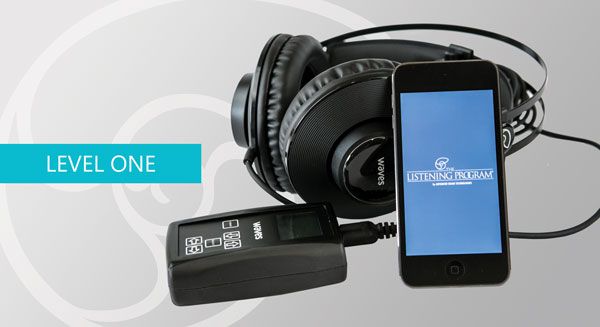
How Can it Help Parents?
Parents of children with autism are stressed, exhausted and often lose hope in the day to day dealing with everything. Because The Listening Program is a stand-alone program purchased by you, it can be a great tool for parents to relieve anxiety and stress. You just need a specific program written for you, but we have special family rates for members of the same family.
Using sound therapy in your life will help you deal with the challenges more easily and help you with self-care. It is a wonderful way to look after you as you are busy looking after everyone else!
Improving Brain Connectivity and our Neural Networks is Vital
If a child or adult cannot read, doing more reading is not going to fix the problem until the connections needed are made at brain level, clearing the learning pathways, and allowing permanent learning to occur.
If a child is having problems with speech, while speech pathology is necessary, using this alone will not be as effective as working to change the neural networks within the brain which then opens the necessary learning pathways.
The two therapies together open the floodgates for learning, allowing information to be effectively held within the brain and the body to master how to produce the sound.
Opening the pathways in the brain which are like doorways that are locked, preventing learning, give your child the best opportunity to achieve success and live to their potential.
- It’s through listening that we find a connection to learning.
- It’s through learning that we find a connection to communication.
- It’s through communication that we find a connection to life.
Improving Auditory Processing Through Music
So the question becomes…how can we improve autism challenges—moving from a “disorganized” to an “organized” system? Certain classical music, like that of Mozart, Haydn and Vivaldi, is highly structured, producing sound waves in organized patterns.
When listening to music, the ear is receiving the musical sound waves—waves that arrive in different frequencies, measured in Hertz (Hz). These frequencies stimulate the brain, and thus affect contrasting functions of the mind and body. At the same time, our skeletal system is also processing sound making it a full body experience.
The Listening Program’s psychoacoustically modified music and patented production treatments are designed to stimulate, or “exercise,” the different functions of the auditory processing system. This can enable the brain to better perceive a fuller range of frequencies, organize the information, and respond appropriately.
What Can I Expect?
- Home based therapy
- Fits into any schedule
- 15 – 30 minutes of listening per day (5 days a week)
- Suitable for 2+ years through to (and including) adults

TLP has 4 main programs available and one (or two) will be chosen for you depending on your needs.
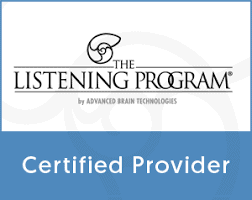
TLP approved headphones must accompany the program.
We recommend the bone conduction waves system. Included is:
- 32gb ipod
- listening programs
- waves bone conduction system including TLP approved headphones
Prices start from $2,900 depending on the program chosen for you.
Frequently Asked Questions
- What is Auditory Processing?
- How Long Does it Take to Complete the Listening Program
- How quickly can we expect results?
- Will the results fade over time?
- Are There Any Side Effects?
- Can The Listening Program be used by people with hearing aides or cochlear implants?
- How is TLP different from other auditory stimulation programs?
What is Auditory Processing?
Auditory processing is the term used to describe what happens when your brain recognizes and interprets the sounds around you. Humans hear when energy that we recognize as sound travels through the ear and is changed into electrical information that can be interpreted by the brain.
How Long Does it Take to Complete the Listening Program?
Listening sessions are typically fifteen minutes in length, done once or twice a day, five days a week. The program length varies depending on the listener’s goals. The minimum time recommended is forty hours over the course of 20 to 40 weeks. Many people find it advantageous to repeat the program periodically and to move on to other products provided by ABT and use TLP Specialized CDs for further benefits. It depends on your challenges and your goals.
How quickly can we expect results?
It depends on the individual’s goals for listening and what else is being done along with TLP to accomplish the goals. The brain needs a certain amount of repeated stimulation in order to remember new information and integrate it for functional use. Some people see change within a few days, others after completion of forty hours of listening. There is no way to know in advance the exact amount of time it will take.
Will the results fade over time?
Research on the use of TLP with auditory processing issues has shown that results continue to occur for up to one year after completion of the program, then plateau, with the most measurable results occurring 2-9 months after completion.
We recommend you complete at least forty hours and continue some level of continued listening. Your provider will tailor make a program for you depending on your situation and will give guidance according to your needs.
The Listening Program is very much like a physical exercise program. You need to do it on a regular basis, put some real effort into it, and keep at it. You may be fit for a time after an exercise program, but you won’t stay that way if you stop exercising or lead an unhealthy lifestyle.
If the listener is healthy and does not do things to adversely impact his health the changes that result from TLP will last. Others may need to do 1 cycle of listening once or twice a year to maintain benefits.
Are There Any Side Effects?
The Listening Program is a safe, non-invasive method of music-based auditory stimulation. TLP’s patent pending modular design supports auditory stimulation. TLP’s patent pending modular design supports listeners as they gradually progress through increasing levels of stimulation.
Tens of thousands of listeners have safely used TLP. Some people may experience undesired changes for a brief period of time, ranging from a few minutes to a few days. These changes can be viewed in two categories:
- Behavior or emotional regulation. These types of changes are generally an indication of a transition during the time it takes the brain to learn a new pattern and to reorganize. These changes are often accompanied by positive changes in auditory processing, communication abilities and other areas. Those experiencing these changes should continue listening until the changes resolve. If the changes are too disruptive, modifications can be made to the Listening Schedule.
- Physiological function. These changes may be experienced during or immediately following a Listening Session and can include a sense of feeling “off “, nausea, headache, or dizziness. If these persist, listeners are encouraged to consult a health professional to ensure there is not an underlying health issue causing the changes. Some of these changes can also indicate an area of weakness in the body that may need attention.
Can The Listening Program be used by people with hearing aides or cochlear implants?
Yes it can.
